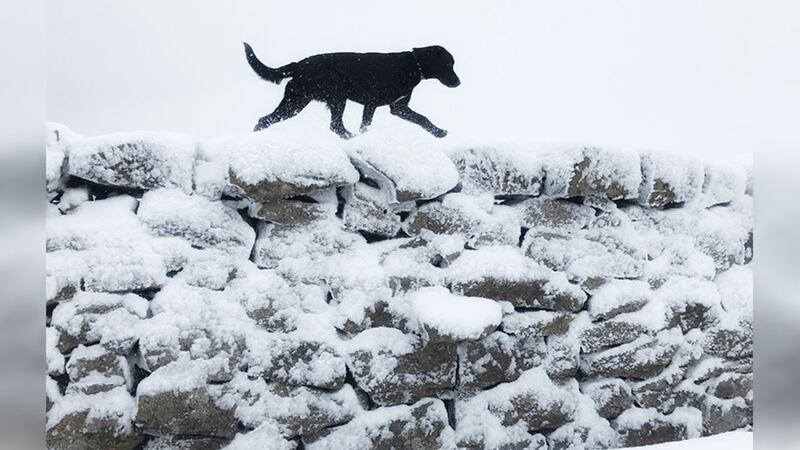Lexie the labrador had it sussed on Saturday. The easy way to the top of Commedagh was trotting up the Mourne wall on four paws.
Unfortunately, for those of us on two legs, trudging through heavy snow wasn’t as straightforward. Still, beyond the aches and the effort (and a handy hip-flask of 15-year old Glenfiddich) there was something beyond bewitching about the experience.
At certain points the Mourne wall was almost smothered by the drifts. In other places, the firmness of icy crust belied bear-trap holes that swallowed legs up past the knee.
But the hardest ground (as always) was in the head – knowing how far was far enough that day, or hearing the right words to keep on going.
Up on top of Commedagh, Lexie lorded it - stealing a walker’s lunch and nosily nosing into others’ bags.
There wasn’t much to see except snow. And yet, slowly, that was indeed the prize; a formidable and seamless beauty without horizon, the inexplicable fixation of fantastic icy formations.
As our descent started, just after crossing the next style over the wall, Lexie started nosing again into the snow.
This time, the lunch was a nasty piece of litter, an empty aluminium can with the top ripped back from which mackerel had been eaten.
So there we were, in the middle of this unbelievably spectacular snowscape that nature had conjured onto the deep-rounded valleys and stony-peaked summits of a magical ice-age legacy, and someone had – either intentionally or carelessly – travelled up to that vista before tossing away their aluminium lunch box. Classy.
It’s the type of can on which an animal might slice itself, dumped without any regard for the basic responsibility of recycling.
‘Sure it’s just one case’ you might say, ‘and maybe it was just a mistake’. You might also suggest that discarded aluminium cans aren’t really that damaging to the natural environment.
But as I emptied my gear on Sunday, and peeled out the sweet papers and wrappings and two blackened banana skins (that could arguably have been thrown away), I thought about what mummy used to say: ‘would you ever have a titter ’a wit’.
The excuses don’t cut it any more. The sad - and angering - fact is that an empty aluminium can on top of Commedagh is reflective of a social culture that must now be constantly challenged.
Aluminum comes from mining the earth’s resources. It requires energy and processes that pour damaging gases into the atmosphere.
Yet it takes just 5 per cent of the original energy used for mining the metal to recycle the aluminium cans after use (which are 100 per cent recyclable). So recycling is a no-brainer, especially in circumstances where energy conservation is becoming critical.
The same principle applies to all the other choices of convenience that we now make to enable the speed and style of ‘modern’ life.
We need to consistently call out this constant, throw-away, fast-food, couldn’t-care-less, self-centred disregard for the sustainability of our planet – a creation that we are rapidly killing.
All of the available evidence indicates that we could be the first species, in this generation, that proactively creates the methods of our own extinction – despite knowing what steps we must take today in order to avoid that growing inevitability.
That is a terrifying testament to the global culture we have created, based on patterns of brutal profit margins, and sustaining economic and environmental inequality and poverty.
Of course, it’s always important to focus on government and big business and industry, and the types of structural policies and procedures that can enforce environmental and economic change in those arenas.
Ultimately, however, our planet’s survival requires a personal choice from each of us. It’s about our individual responsibility, every single day.
Every aluminum can that we discard, and every plastic paper that we drop, becomes another pebble of poison infecting the rising tide of future generations.
Significant progress in waste recycling and environmentally-friendly sustainable energy solutions has been made to our socio-economic structure in the last two decades – not least here in Ireland.
And yet we’re still forced to play catch-up with a conveyor belt of global greed that is fast out-running our best intentions. It means we each have to do more and do it better.
Every day we enjoy the chance to experience millions of years of environmental beauty all around us. You don’t have to be on top of a stunning snow-capped summit to appreciate it. But if you don’t even care when you’re gifted that particularly special privilege, well then, something’s badly wrong.








